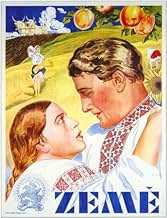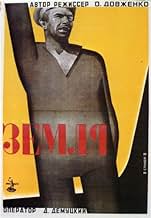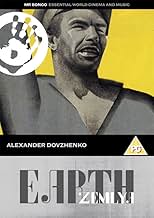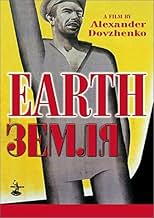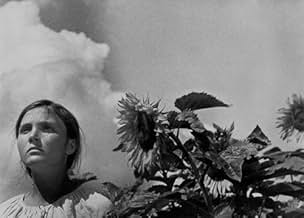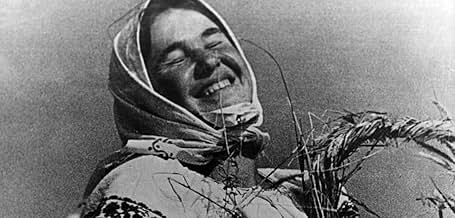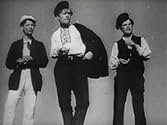VALUTAZIONE IMDb
7,2/10
6767
LA TUA VALUTAZIONE
Aggiungi una trama nella tua linguaIn the peaceful countryside, Vassily opposes the rich kulaks over the coming of collective farming.In the peaceful countryside, Vassily opposes the rich kulaks over the coming of collective farming.In the peaceful countryside, Vassily opposes the rich kulaks over the coming of collective farming.
- Regia
- Sceneggiatura
- Star
- Premi
- 1 vittoria e 1 candidatura in totale
Stepan Shkurat
- Opanas
- (as S. Shkurat)
Semyon Svashenko
- Vasyl - son of Opanas
- (as S. Svashenko)
Yuliya Solntseva
- Daughter of Opanas
- (as Yu. Solntseva)
Yelena Maksimova
- Natalya - Vasyl's fiancee
- (as Ye. Maksimova)
Nikolai Nademsky
- Ded Semyon
- (as N. Nademsky)
Ivan Franko
- Kulak Belokon
- (as I. Franko)
Pyotr Masokha
- Khoma - son of kulak Belokon
- (as P. Masokha)
Vladimir Mikhaylov
- Priest
- (as V. Mikhaylov)
Pavel Petrik
- Young Party-Cell Leader
- (as P. Petrik)
P. Umanets
- Chairman of the Village Soviet
- (as Umanets)
Luka Lyashenko
- Young Kulak
- (as L. Lyashenko)
Vasiliy Krasenko
- Old Peter
- (non citato nei titoli originali)
M. Matsyutsia
- Farm Girl
- (non citato nei titoli originali)
Recensioni in evidenza
Now I regret all the times I've railed about how propaganda is synonymous with contempt for the audience. It is sometimes hard to know what to say about a movie when it is a 'best of all time list' warhorse, but not this time. I have never - ever - seen a movie with a more deliberate, or surer, sense of rhythm. Two sequences that are nothing but long montages of fruit are absolutely riveting. A man sits, re-evaluating his world view, and because it takes a long time to do that we fade to black THREE times over about a minute, without him moving or changing position. This glacial tempo lulls us, so that Dovzhenko can jolt us with the arrival of a speedy tractor; or a collectivo's joyous dance through the dust over several lengthy wide shots is disrupted by his abrupt murder. Then the movie climaxes with an unbelievable crescendo where at least FIVE events are montaged, in perfectly comprehensible rhetorical construction. The movie begins with a death scene whose understated acting is mind-boggling even now, forget 1930; the final shot balances all the anti-church rhetoric with an image that is absolutely redemptive and spiritual, only the point is that redemption is found in LIFE. I'm not being pompous, this movie actually functions on that level. It achieves poetry AND propaganda in a way that I've never ever experienced before. It kind of reminds me of Brian Wilson's "Smile" in its modest grandeur, so true that it's painful, but so f***ing great that you want to experience it again and again. You can get it for free at the St. Catharines Library.
Like 'The Birth of a Nation' or 'The Triumph of the Will', 'Earth' is a brilliant, groundbreaking film even if morally despicable. And in retrospect of what happened after its release, Stalin's liquidation of millions of Kulaks, its hard not to compare Dovzhenko's Marxism to Reifenstahl's fascism or Griffith's racism. Apologists for all of these filmmakers tell us to 'ignore the story' or 'ignore the propaganda'. Even the Kino DVD introduction instructs us to not take the film literally.
Perhaps instead of asking, 'Can propaganda be art?' the better question is , 'Can art transcend propaganda.' In 'Earth', I think Dovzhenko partially succeeds. The lyrical cycles of birth and death on the Ukrainian steppe are told with visual poetry. In fact, as the film goes on Dovzhenko obviously becomes uninterested in the circumstances of Vasily's murder and martyrdom for the collectivist cause. No doubt, the Soviet regime produced this film to (a) encourage collectivization against private ownership, and (b) Encourage a retro-pagan worship of agrarian life against orthodox Christianity. The collectivist vs. Kulak story in (a) is crude and unconvincing propaganda to a modern audience with historical perspective on Stalin's brutalities in the 1930's. However, it is with the fertile imagery and montage of natural cycles in (b) that Dovzhenko succeeds beautifully and transcends the story and makes it timeless.
Perhaps instead of asking, 'Can propaganda be art?' the better question is , 'Can art transcend propaganda.' In 'Earth', I think Dovzhenko partially succeeds. The lyrical cycles of birth and death on the Ukrainian steppe are told with visual poetry. In fact, as the film goes on Dovzhenko obviously becomes uninterested in the circumstances of Vasily's murder and martyrdom for the collectivist cause. No doubt, the Soviet regime produced this film to (a) encourage collectivization against private ownership, and (b) Encourage a retro-pagan worship of agrarian life against orthodox Christianity. The collectivist vs. Kulak story in (a) is crude and unconvincing propaganda to a modern audience with historical perspective on Stalin's brutalities in the 1930's. However, it is with the fertile imagery and montage of natural cycles in (b) that Dovzhenko succeeds beautifully and transcends the story and makes it timeless.
10Rigor
This great masterpiece of Soviet cinema has images so powerful and an editing technique so bold that at times the narrative is transcended. By this I mean that the film goes beyond it's original intention of arguing for changes from individualistic to more technologized and collective agricultural strategies and becomes a kind of realization of what a "liberated" agricultural zone would really look and feel like. This is a film ripe with the excitement of the creation of a new art to match a hopeful new world. It hardly needs to be mentioned that Stalinsit forces decried the final results of this masterpiece; calling it decadent and stylistically elitist. In actuality the film is too Marxist (I would go so far as to say too Leninist) for Stalinism. The film respects the ability of the viewer (and the viewers were assumed to be proletariat working class and agricultural workers) to grapple with rigorous ideas and images and to function outside of the narrative frame of individualistic melodrama. Like many early Soviet films this work seems not only ahead of its time, but, actually ahead of ours.
Dovzhenko was a 'modernist' who drew deepest inspiration from traditional arts. His ode to the beginning of the collectivization is actually an orgy of intoxicant images of bulging clouds, waving wheat fields, ripening fruits and pelting horses.
The arrival of a tractor is hailed by the farmers. They begin to believe that an improved life has started, but Kulaks murder the young leader of the village party committee. This only encourages the village inhabitants in their resoluteness. In a sublime finale sequence, Dovzhenko unites birth, death, harvest, technical progress and solidarity, when the dead are returned to Earth that he loved so much.
No abstract summary can do justice to the extraordinary sensualism of this remarkable film. Whoever searches for the roots of Andrei Tarkovsky's cinema has to start with "Zemlya".
The arrival of a tractor is hailed by the farmers. They begin to believe that an improved life has started, but Kulaks murder the young leader of the village party committee. This only encourages the village inhabitants in their resoluteness. In a sublime finale sequence, Dovzhenko unites birth, death, harvest, technical progress and solidarity, when the dead are returned to Earth that he loved so much.
No abstract summary can do justice to the extraordinary sensualism of this remarkable film. Whoever searches for the roots of Andrei Tarkovsky's cinema has to start with "Zemlya".
10miloc
From its opening, with an elderly man dying surrounded by impassive adults and obliviously playing children, to its wildly emotional finale, this breathtaking silent work transcends its politics and functions as poetry. It's unmistakeably Soviet -- the messianic fervor of the scene in which the farming community greets the arrival of a tractor would seem like parody if it weren't for Dovzhenko's extraordinary sense of lyricism. Using repeated shots of the expectant farmers crying out "It's coming!" intercut with an empty horizon, he builds the moment so completely that you're excited in spite of yourself; you totally believe in that tractor. (As one of the "rich farmers" says, shellshocked by this threat to their future, "It's a fact. It's here.")
To call the film propaganda, while true, seems rather beside the point. Aren't all films? Dovzhenko's manipulations are certainly no less devious than those of western film. Switch the communist message to a patriotic or even capitalist one, and the setting to the World War II Pacific or the old west or wherever you choose and it's no different than, say, "Shane" or "Gone With the Wind" or "The Passion of the Christ" -- just much, much better.
The story, told in rich montages of motionless figures, fruit, machinery, skies, rippling fields, and above all faces, weaves its "official" message about collective farms and private property with larger themes of religion, the generation gap, and the cycle of life: the Earth that gives life takes it away. A group of children giggle and spy on an old man listening at his friend's grave for a last message; a man sits up on his deathbed to eat a last sweet pear; a serious young radical, alone, gives himself up to a joyful moonlit dance before falling into the dirt. Dovzhenko's approach has less to do with narrative than with creating visual textures; it looks as though Terrence Malick watched this more than a few times before making "Days of Heaven." Dovzhenko's discontinuities and repetitions can be initially bewildering, but they pack a concrete wallop. The images accumulate and crystallize, carrying greater and greater weight, and, as an aging farmer becomes suddenly radicalized by tragedy, the direct shots of his face, hardening in bewilderment and outrage, take on a thunderous power.
To call the film propaganda, while true, seems rather beside the point. Aren't all films? Dovzhenko's manipulations are certainly no less devious than those of western film. Switch the communist message to a patriotic or even capitalist one, and the setting to the World War II Pacific or the old west or wherever you choose and it's no different than, say, "Shane" or "Gone With the Wind" or "The Passion of the Christ" -- just much, much better.
The story, told in rich montages of motionless figures, fruit, machinery, skies, rippling fields, and above all faces, weaves its "official" message about collective farms and private property with larger themes of religion, the generation gap, and the cycle of life: the Earth that gives life takes it away. A group of children giggle and spy on an old man listening at his friend's grave for a last message; a man sits up on his deathbed to eat a last sweet pear; a serious young radical, alone, gives himself up to a joyful moonlit dance before falling into the dirt. Dovzhenko's approach has less to do with narrative than with creating visual textures; it looks as though Terrence Malick watched this more than a few times before making "Days of Heaven." Dovzhenko's discontinuities and repetitions can be initially bewildering, but they pack a concrete wallop. The images accumulate and crystallize, carrying greater and greater weight, and, as an aging farmer becomes suddenly radicalized by tragedy, the direct shots of his face, hardening in bewilderment and outrage, take on a thunderous power.
Lo sapevi?
- QuizSoviet censors made Aleksandr Dovzhenko eliminate a number of scenes from the film, including the scene of peasants urinating into a tractor radiator, and the scene of nude woman mourning over her dead fiance. The original uncut version was screened in Ukrainian republic when first released, and then in the Museum of Modern Art (New York City, USA) about 40 years later, on 10 October 1969.
- Versioni alternativeIn 1997, the film was re-released in Germany by ZDF, with a new score composed by Alexander Popov. This version was digitally improved (known as Arte Edition), then released on DVD and distributed by the absolut MEDIEN GmbH in 2006. The running time is 78 minutes. The crew participants:
- Alexander Popov, Composer;
- Frank Strobel, Conductor;
- Evgeniy Nikulskiy, Sound engineer;
- Nina Goslar, Commissioning editor.
- ConnessioniEdited into Le tombeau d'Alexandre (1993)
I più visti
Accedi per valutare e creare un elenco di titoli salvati per ottenere consigli personalizzati
- How long is Earth?Powered by Alexa
Dettagli
- Tempo di esecuzione
- 1h 15min(75 min)
- Mix di suoni
- Proporzioni
- 1.33 : 1
Contribuisci a questa pagina
Suggerisci una modifica o aggiungi i contenuti mancanti


